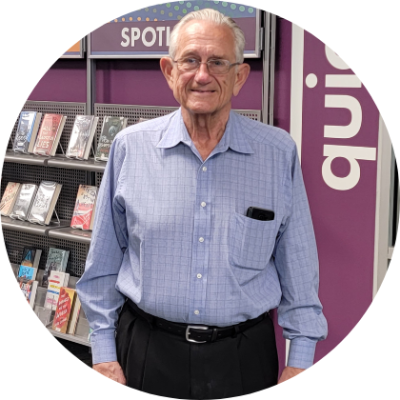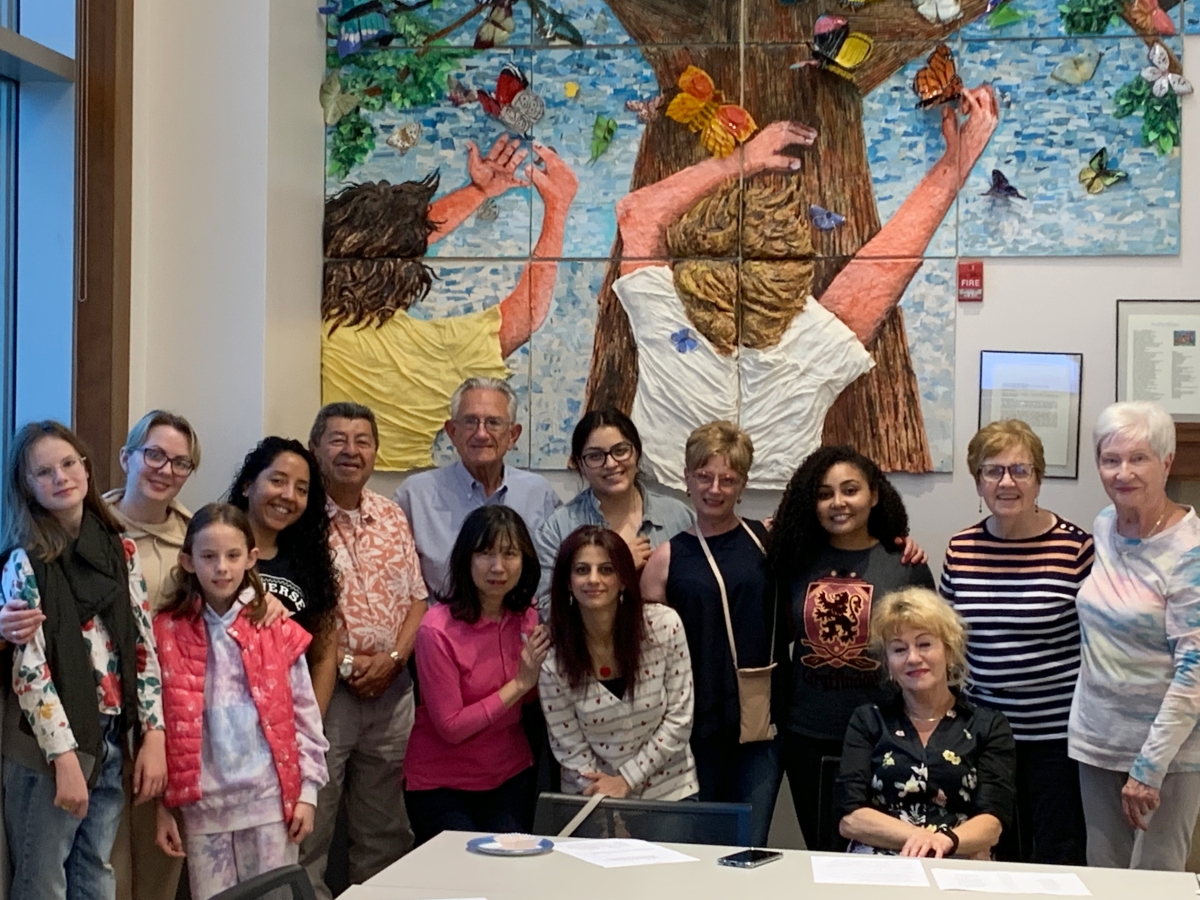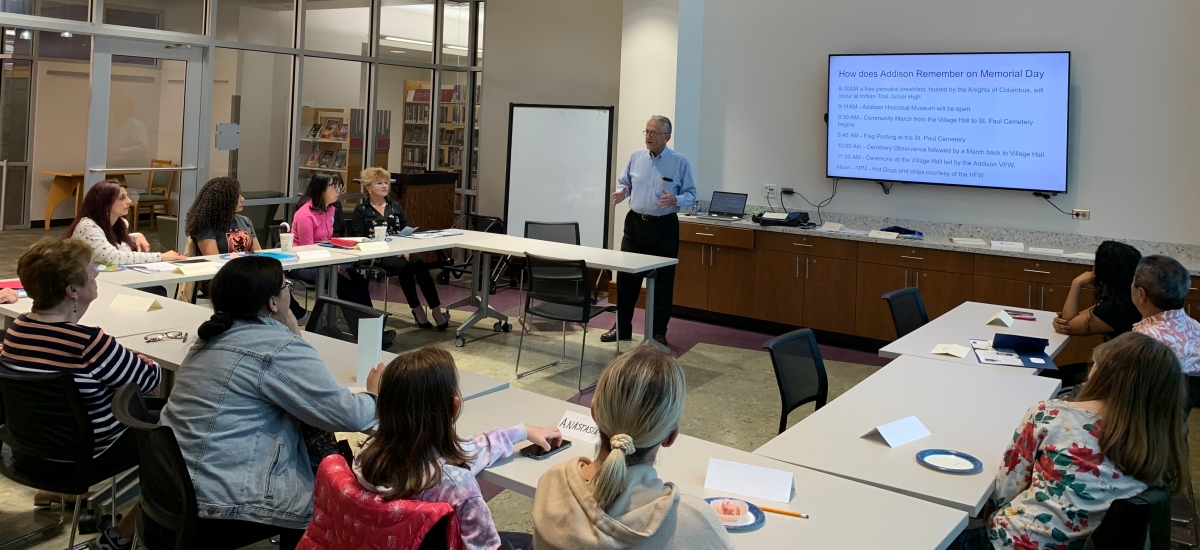
Emily Glimco, Communications & Marketing Coordinator
May 2022
When Allen Polich first moved to Addison in the fall of 2020, he didn’t expect he’d become a regular visitor to the Addison Public Library. But after receiving the library’s newsletter and spotting an intriguing volunteer opportunity, everything changed.
The timing worked out perfectly, Polich said: he had just decided he was finished coaching high school football and realized he had time on his hands when he found out the library was looking for English language learning (ELL) volunteers.
“I was a teacher for 13 years, so I decided to give [ELL volunteering] a whirl,” said Polich.
When Polich first became a volunteer, the English Reading Circle met on Zoom. Participants would get online, read for a bit, then ask questions about what they read and ask about unfamiliar words or phrases. Polich said meeting virtually was a challenge, but was a bright spot in his life during an isolated time.
“To see how enthusiastic people are about learning new words is amazing. Just listening to them, and some of the questions they had, it was interesting and fun,” said Polich. “It was a great way to interact with people during the pandemic. It filled the void.”
Polich volunteers for both of the library’s in-person ELL groups: the English Reading Circle, which meets every Tuesday morning at 11:00, as well as the English Conversation Group, which meets every Wednesday evening at 7:00. In the library’s ELL classes, Polich has gotten to know people from all over the world: Iraq, Japan, Brazil, Guatemala, Ecuador, Colombia, and a number of people from Mexico. While learning more about how the ELL group participants came to America, Polich has often reflected on his own family’s journey.
“My grandfather’s father came to America with his father in 1898 from Croatia, when he was just 18 years old. His father went back to Croatia, but my grandfather met my grandmother and stayed. My dad, a first generation American, he didn’t pass first grade because he couldn’t speak the language,” said Polich. “That’s lived with me my whole life. I’ve never forgotten that.”

Polich recalled that his family never spoke Croatian at home; like many Americans whose families immigrated in the late 19th and early 20th centuries, his family focused on assimilation and lost touch with their roots. But thanks to the ELL class, Polich got to reconnect with a part of his heritage.
“Around the holidays, we talked about the different customs in different countries, and I talked about a memory from my childhood. We’d all be in the little kitchen at my grandma’s house, and she’d throw walnuts in each corner of the room, and my aunts and uncles and I never knew why,” said Polich. “But we have someone from Poland and someone from Bulgaria in class, and I found out that’s something they traditionally do in their countries, too.”
While Polich has been an English speaker for his entire life, he recognizes the language can be complicated to learn.
“I remember one day in class, I was talking with someone who could read English very well, but she didn’t know the language well enough to know what she had read without stopping to translate in her mind from her spoken language to English,” said Polich. “It was just like my experience taking Latin in high school. You could read the words, but you had to stop and go over it again to find out what a sentence really said. So I could relate to her experience of learning English. And English is a tough language to learn, for sure.”
When he thinks back on his worldview before he started volunteering, Polich said he used to feel there was a resistance to learning English, but he quickly found out that was not the case.
“One person in our group has been in America for 20 years, but at work everyone spoke Spanish, so she rarely had a chance to practice English,” said Polich. “Everyone in [the ELL groups] wants to learn English, but how are you going to start a conversation with someone you don’t know at the store? You could go to school to learn formally, but if you’re someone who has just come to America, that’s very intimidating.”
That’s why the library is the perfect place to learn English, Polich said.
“The library is a place where people can come that’s nonthreatening. In the old days, you didn’t dare talk very loud in the library. That’s all gone now. Now, we’re here to talk,” said Polich.
After sharing so many conversations with one another, Polich said the ELL groups have a strong connection that inspires him.
“These people are my friends. I’ve learned so much more than I’ve ever given out at this class. Everyone has bonded together and we all look forward to seeing each other,” said Polich. “These days things are so contentious in this country, but it’s not here [in class]. Here, it’s the exact opposite. It’s the way you wish things were.”
In addition to finding a fulfilling volunteer role, Polich also discovered all the items and resources that are available to him as an Addison Public Library cardholder, which was a pleasant surprise after many years without using a library card.

“I couldn’t tell you the last time I came into a library before I came [to the Addison Public Library]. ‘You have the internet,’ I thought, ‘what do you need a library for?’ “And then I came here,” said Polich. “When I started volunteering, I discovered everything else about the library has to offer, like the Library of Things and all the CDs, and my gosh it’s a wonderful place. And so much more than you get on the internet.”
Polich said he looks forward to the day the library has to move the groups to a larger room to accommodate more people and wants more people to see the library as a place where you can get involved and learn new things.
“This place helps build an international community,” said Polich. “No question about it.”